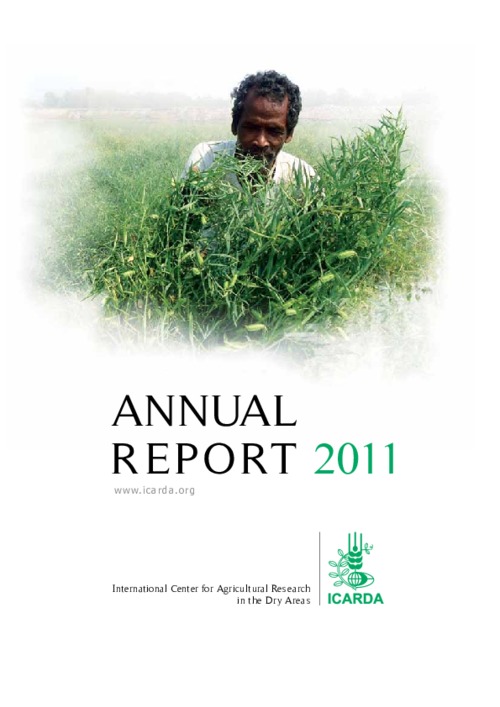Resource information
Poverty, food insecurity, natural resource degradation and climate change are global challenges; but they impact most severely on rural communities in dry areas. Addressing these challenges requires a combination of good science, integrated research-for-development approaches, and effective partnerships. As this report illustrates, all three elements are in place, resulting in new technologies and tangible benefits in more than 40 countries.
This year saw the inception of the CGIAR Research Program, “Dryland Systems” (CRP1.1) – a global initiative led by ICARDA and implemented in partnership with more than 80 institutions worldwide. The program uses a multi-disciplinary, agro-ecosystems based approach to improve food security and livelihoods in dry areas worldwide. Program partners are working together to better define research targets, action sites, implementation mechanisms, and monitoring measures in five target regions: West Africa Sahel and the Dry Savannas; East and Southern Africa; West Asia and North Africa; Central
Asia and the Caucasus; and South Asia.
This report describes new technologies, tools and approaches that ICARDA and its partners have developed. These include innovations in drought mitigation, climate change adaption, water management, control of wheat rust diseases, pest management methods, new lentil varieties to improve income and nutrition, and wheat varieties that combine hardiness with high yield potential.
Two large-scale, multi-country research projects – Enhancement of food security in the Arab region and the Water and Livelihoods Initiative – reported a second season of excellent results. Technologies introduced through these projects are helping to increase crop yields, water-use efficiency and research-for-development capacity in each target country.
Plant breeders have developed new high-yielding, stress-resistant varieties of a range of crops, using germplasm or breeding material supplied by ICARDA. In 2011, at least 26 new varieties were released for cultivation in 11 countries. Low-cost technologies are being scaled out to increase water productivity in both rainfed and irrigated areas. Integrated crop-livestock-rangeland approaches are helping to increase sustainability and productivity in marginal areas, and create new income streams for small-scale sheep and goat producers. National research programs are being strengthened through a Young Scientist Program, initiated in 2011.
Several new initiatives were launched in 2011, aiming to scale out results from earlier projects. New research projects were initiated in South Asia, Sub-Saharan Africa, North Africa and West Asia. An agricultural information network was launched, linking seven countries in North Africa and West Asia.
ICARDA joined the Regional Partnership Framework on Food Security in Asia and the Pacific. In South Asia, collaborative research programs were established with Bangladesh and Nepal; and the partnership with India culminated in ICARDA’s Board of Trustees meeting and a joint India-ICARDA Day, both hosted by the Indian Council for Agricultural Research.
Development investors have been critical to these successes. ICARDA is highly appreciative of the many donors who have supported the Center’s activities – not only in 2011, but for over 30 years.
In most developing countries, dryland agro-ecosystems hold the key to food security. ICARDA’s goal is to work with partners to unlock the agricultural potential of dryland areas worldwide. We are happy to report that, together, we are making rapid progress.


